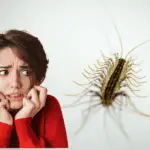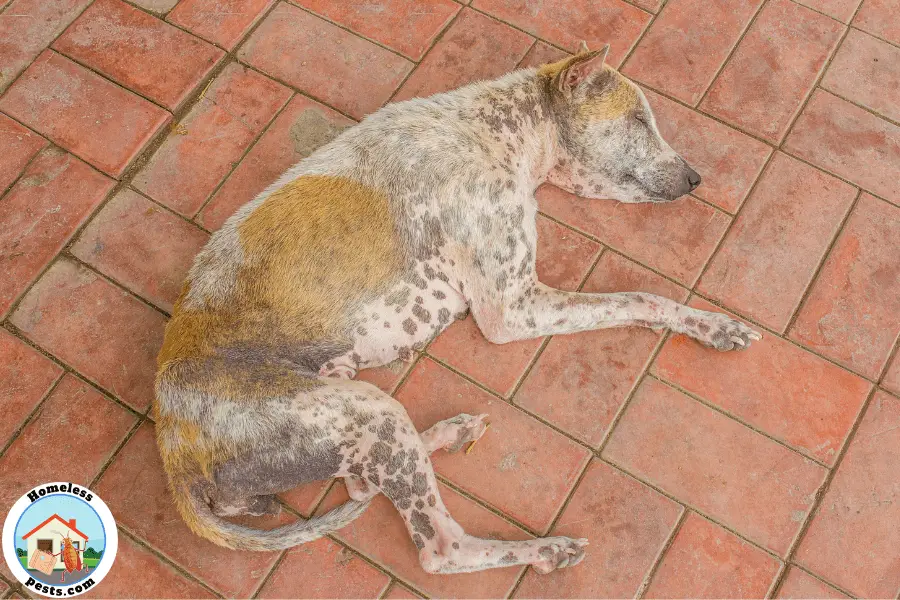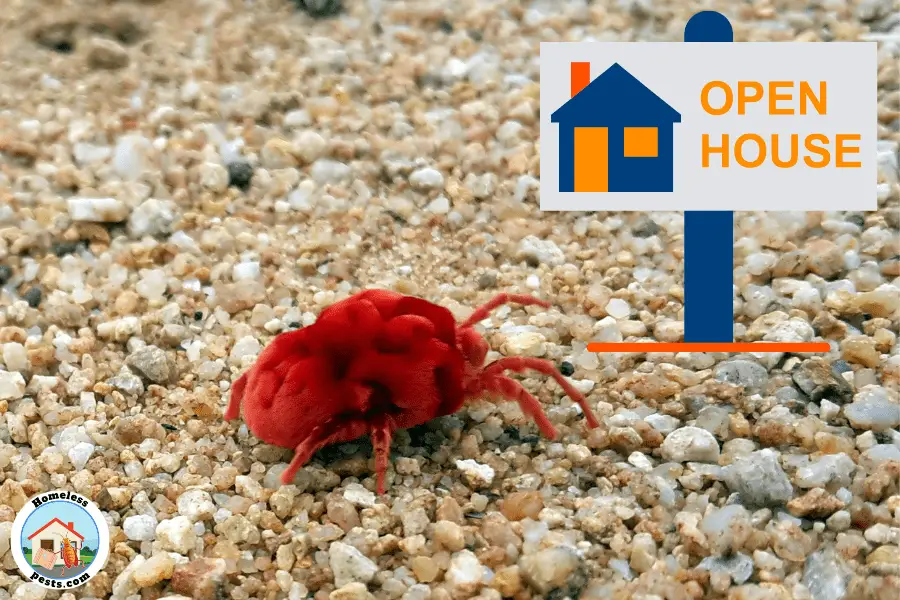Firstly, let’s set the scene. You are most likely going to find chiggers in areas with high grass and weeds. These annoying little critters also like to lurk in wooded areas, and around shrubs. So if you’re planning on going for a hike in the woods, or a walk through a field of tall grass, you might want to take some precautions against chiggers! (See a full list of chigger locations in the USA).
Whereas with your pets it’s quite easy for a chigger to catch a ride on their fur (these are incredibly slow-moving bugs), with humans they have to catch a ride in another way. For us, they typically climb up our pants legs, or sleeve cuffs, in order to find a place to feast. Eventually, they will reach a nice patch of skin that is thin enough for them to penetrate and begin feeding.
While the truth is it just bites the potential skin area and leaves after a few hours. Within a few hours, you will notice red bumps and itchiness on the skin. Sometimes chigger bites can also lead to fever and nausea.
How to be sure you’ve been bitten by a chigger

In fact, it is only during its larva phase that a chigger will bite, after which it becomes predatory rather than remaining a parasite. If not interrupted, a chigger can easily stay attached to its host for 3 days before dropping off to digest its meal.
For humans, this doesn’t seem to happen as often. this is because we groom ourselves more frequently than other animals and so the chiggers are more likely to be removed before they can complete their feeding.
Probably you are more likely to notice the bite before you discover an attached chigger. A chigger bite will present as a small, red welt on the skin (often in small groups) that is intensely itchy. This is caused by the chigger injecting its saliva into the bite area in order to break down skin cells so that it can feed more easily.
Chigger bites are somewhat different from other kinds of bites in terms of appearance. (see my full article about chigger bites for more details).
Some people also report suffering the following symptoms:
-A burning or stinging sensation
-Swelling around the bite area
-fever
–nausea
The good news is that, although a chigger bite can be very uncomfortable, it is not harmful and will eventually go away on its own. However, if you are concerned about the bite or if it is not healing, it is always best to consult with a medical professional.

What bit you? Chigger Bites Vs Flea Bites
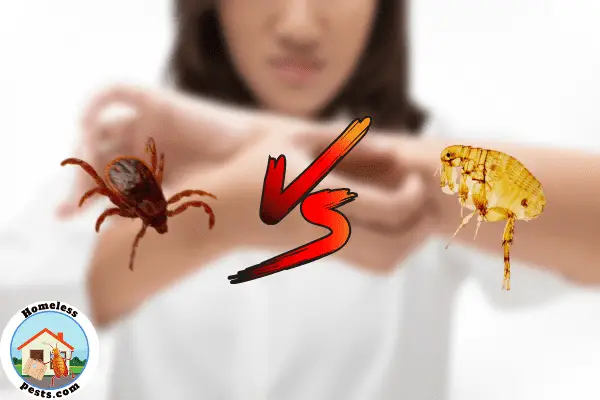
The major difference between chiggers and fleas is their preferred habitat. Chiggers are mostly found in grasslands, vegetation areas, and beside areas like lakes or streams. Although fleas can also be found in the great outdoors, they quite often find their way into our homes. This is because they are attracted to the warmth and humidity that our homes offer. Once inside, fleas will make their way into our carpets, beds, and upholstered furniture. If you have a pet, chances are that your flea problem started with them. This is because fleas often hitch a ride on our furry friends when they come inside.
Another difference between chiggers and fleas is their appearance. Chiggers are very small, red mites that are barely visible to the naked eye. Fleas, on the other hand, are much larger and can easily be seen with the naked eye.
When considering how a chigger’s bite is different from flea bites, you have to be aware of a few things. For starters, chiggers do not actually bite. Instead, they puncture the skin and insert their saliva into the wound. This saliva contains enzymes that dissolve tissue, which the chigger then feeds on. Fleas, on the other hand, do bite. They use their sharp mouthparts to pierce the skin and then suck out the blood.
The bites of both chiggers and fleas can cause an intense itching sensation. However, the bite of a chigger is usually more irritating than that of a flea. This is because the saliva of a chigger can cause an allergic reaction in some people. Additionally, when a chigger bites, it can often leave behind its head if beaten off, which can continue to cause irritation. Flea bites, on the other hand, usually do not cause such a reaction.
Let’s discuss a few other differences between these two species.
- While chiggers often tend to stay in your skin for quite a long time, fleas will not. Flea bites are a thing, but a flea, according to one study these pests would need to feed on us for at least 12 hours to gain enough sustenance to lay eggs.
- Another major difference between chiggers and fleas is that fleas mostly bite during their adult or aged stage whereas, chiggers bite mostly in the larva stage.
- By appearance, you can identify fleabites by the red halo rings that appear around three or four clusters in a straight line. Whereas chigger bites mostly look like blisters, pimples, or hives.
- Compared to flea bites, chigger bites are much smaller and appear in groups.
- Chigger bites generally can be seen near ankles or feet since this is where they most often hitch a ride. On the other hand, flea bites can appear all over the body as they can catch us lying down in bed or on the sofa.
What bit you? Chigger Bites Vs Bed Bugs
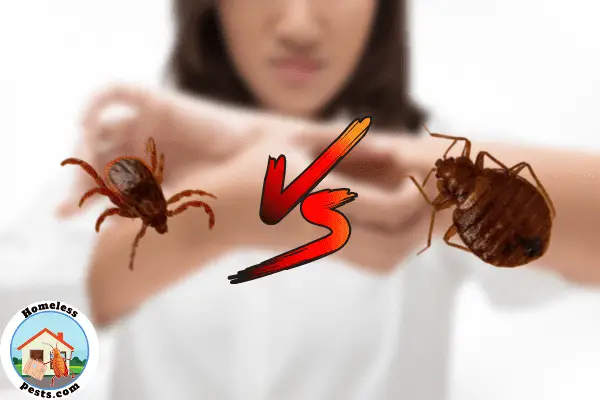
If you compare a chigger to a bed bug, it’s easy to tell them apart. This is because bed bugs are brown or reddish-brown, while chiggers are bright red. If you take a closer look, you’ll also see that bed bugs have shorter legs and a flatter body than chiggers.
Of course, if you don’t have the bug to inspect you can also tell who bit you by the bite they left.
Chigger bites are more likely to occur in areas where clothing is tight against the skin, such as the waist, ankles, and groin (Yes they can crawl that far on a warm summer’s evening). Bed bug bites are usually found on exposed skin as they strike at night when we are more, well, exposed.
Another thing to note is that chigger bites usually appear in groups of red blots or swelling, while bed bug bites can be scattered. It’s also reported by most people that chigger bites are also itchier than bed bug bites. Another thing that can tell you a chigger bit you is that the bites often worsen over time, while bed bug bites do not.
What bit you? Scabies Vs Chigger Bites
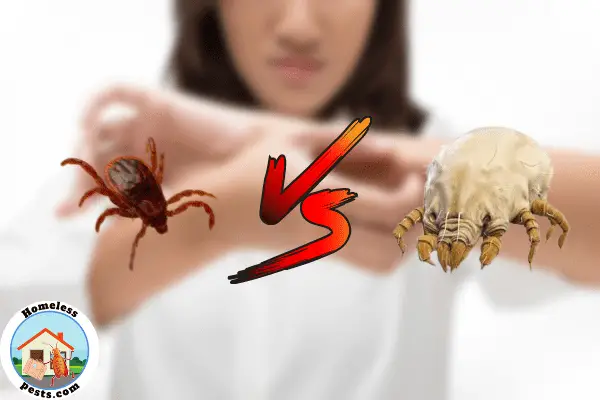
Scabies, a medical condition, and chiggers are both caused by similar species but they occur in two distinct ways. Scabies is actually caused by a mite that burrows into the top layer of your skin to lay eggs. The resulting itch can be unbearable, and the rash caused by the egg sacs is distinctive. Chiggers are not actually insects but larvae (immature form) of a mite in the same family as scabies mites. They attach to your skin and feed on your tissue fluids. The resulting itch is intense but more temporary. The former condition is best treated with insecticides.
So, how do you know if that itchiness is from a chigger (which doesn’t burrow) and these horrible little mites living in your skin and causing scabies?
Duration
While chigger can live on your skin for 2 or 3 days, scabies tends to live for a month underneath your skin. So if it’s been going on for a while, you have scabies
Bite area
Chigger bites are comparatively smaller than scabies., which can easily spread to large areas of the skin.
The power to spread
One of the biggest differentiators between the two is chiggers are not contagious whereas scabies is contagious. With direct contact or skin-to-skin, contact scabies can spread from one person to another. This means that scabies can even spread during sexual contact.
Location of itchiness
Though both the bites are itchy and cause red bumps on the skin, the location varies. While Chigger bites occur on close folded skin areas like ankles, groin, waist, or knees, Scabies occurs on fingers, underarms, around nipple areas, buttocks, etc.
Is it still in there?
Chiggers don’t tend to burrow into the skin to feed, they bite & inject some digestive enzymes. On the other hand, the mites which cause scabies burrow into the skin and live under the skin for months to feast.
Identifying Chigger Bites On Your Dog

One of the most common questions I have been asked about chigger bites is can dogs get chigger bites? The answer is YES!
Often people think that since dogs are covered by fur all over the body they are protected from chigger bites, but the fact of the matter is that dogs can get bitten by chiggers just like humans. Chiggers mostly like to attach to a dog’s head, ear, or around its eyes. This is why I recommend every dog owner removes these pests as soon as possible as untreated chigger bites on dogs can lead to serious problems later.
Symptoms of chigger bites on dogs include red bumps, rashes, Erythema, pimples, and Alopecia.
As a home relief remedy, you can always give some ice packs on itchy areas. If the itchiness persists I recommend you immediately visit a vet and follow their guidance.
5 Effective Treatments For Chigger Bites

Rest assured that there are very rarely any long-term effects of a chigger bite. It’s usually just the unpleasant itchiness you need to deal with.
Some great treatment options include:
– Applying a corticosteroid cream like hydrocortisone to the bite. You can find this at most drugstores.
– Take an antihistamine like diphenhydramine (Benadryl) to help with the itchiness.
– Try calamine lotion. This is a classic chigger bite treatment that can be found in most stores.
– Place a cold, wet cloth on the bite. This can help relieve some of the itchiness and swelling.
– If the itching is really driving you crazy, take a hot bath with oatmeal added to it. The oatmeal will help soothe your skin while the hot water will help relieve the itchiness. Just make sure not to stay in the bath for too long or you could end up making your skin even more irritated.
6 Easy Ways To Prevent Chigger Bites
There are a few things you can do to try and prevent chigger bites in the first place:
– Wear light-colored clothing when you’re out in areas where chiggers are common. This way, you’ll be able to spot them more easily and brush them off before they have a chance to bite.
– Wear long sleeves and pants to cover up as much skin as possible.
– Use an insect repellent that contains DEET when you’re in areas where chiggers are present.
– Avoid sitting on the ground or walking barefoot in areas where chiggers live. This will make it harder for them to hitch a ride and bite you later.
– Inspect your clothing and skin for chiggers after being in an area where they’re present. If you find any, brush them off immediately.
– Take a shower as soon as possible after being in an area where chiggers are present. This will help wash them off before they have a chance to bite.
With these precautions, you’ll find that you don’t need to worry as much about chigger bites. Just remember to stay calm and take care of the itchiness, and you’ll be back to your normal self in no time.
Home Remedies For Chigger Bites
Following are some home remedies to treat chigger bites effectively:
- Scrub the infected areas well with soap and run water on the area to remove any chiggers which are still attached to the skin.
- Holding ice packs or cool cloth on the infected skin can help reduce inflammation, redness, and itchiness.
- Applying a good quality calamine lotion can reduce a lot of inflammation and itchiness overnight.
- If itchiness or redness persists or if the chigger bites are creating too much discomfort, especially at night, you can always consult a doctor and take antihistamines medicines (allergy medicines) orally.

Other articles to learn more about chiggers:


